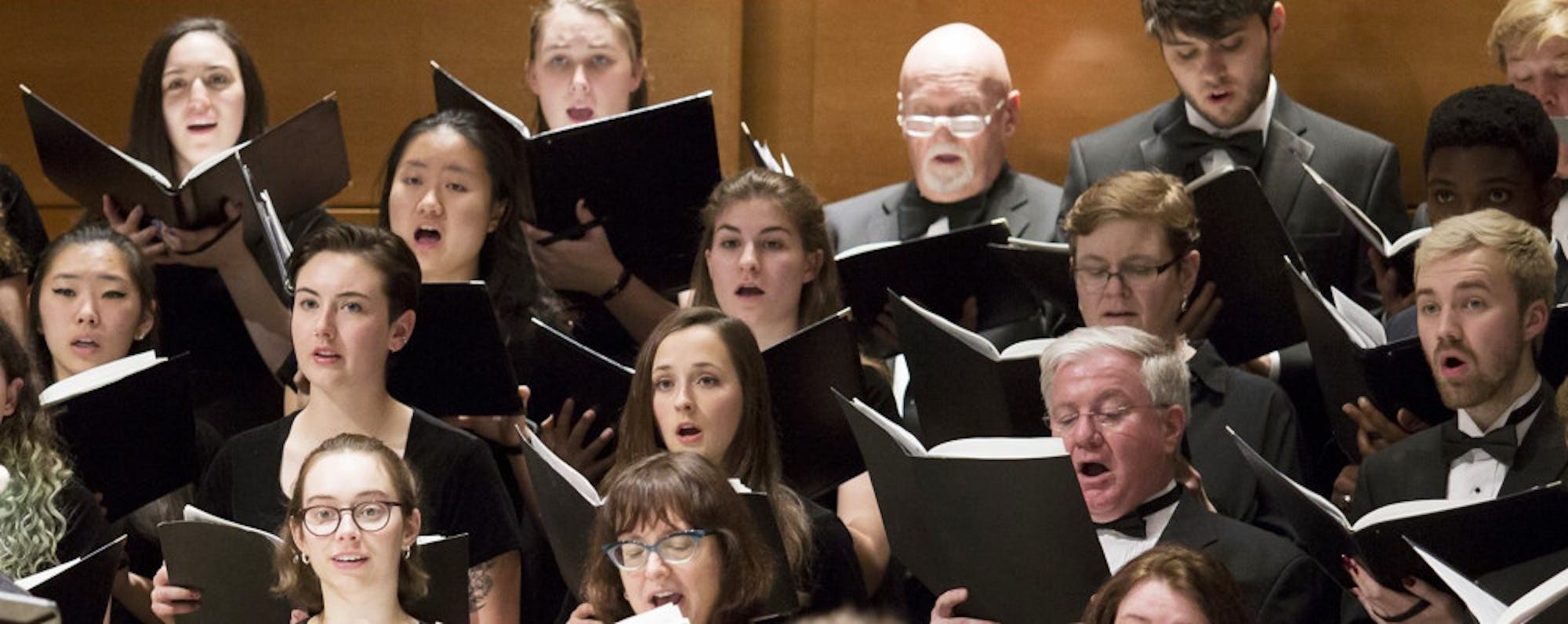On April 7, choir director Jamie Kirsch led the Tufts Concert Choir, Chamber Singers and Alumni in captivating performances of a cappella arrangements by Deke Sharon, the premiere of “Songs for the Earth” by Rebecca Sacks (LA '06) and Johannes Brahms’ “German Requiem” as a part of the Alumni Choral Weekend.
Alum Deke Sharon (LA '91), has become extremely notable in the field of a cappella and choral arrangements and served as the music director and arranger for all three "Pitch Perfect" (2012–2017) movies. This concert featured three arrangements by Sharon: “Orange Colored Sky” composed by Milton DeLugg and Willie Stein, “Aquarius” from “Hair” by James Rado, Gerome Ragni and Galt MacDermot and “September” by “Earth Wind and Fire.” A cappella songs are usually written with the intent that the group performing is small and tight-knit; the group in this concert was much larger than the typical a cappella group but still retained the coherence of a small and intimate group.
The next piece on the program was the world premiere of Sacks’ “Songs for the Earth.” The extremely powerful poems to which the music was set deeply resonated with the audience with their messages promoting environmentalism and efforts to combat climate change. As a composer, Sacks flourishes in her creation of complex harmonic structure underneath emotional melodies, all of which stems from Sacks’ training as a jazz pianist.
The first movement of the three-movement work began with a piano solo, played emotionally by Thomas Stumpf, and conveyed feelings of grief and mourning, both of which were reinforced by the choir’s entrance several minutes into the work. The second movement, “My Heart Soars,” began with a haunting solo in the tenor and bass sections, which highlighted their ability to produce a deep and full sound, and grew into a celebration of the beauty of nature.
Melismatic passages aided in placing an emphasis on certain words in the movement, most notably the word “soars,” which had a soaring melody that fluidly moved throughout the choir. The final movement, although having the least amount of text, was temporally the longest, and was representative of the grief and joy regarding the environment coming together, exhorting the listener to take action in environmental protection and appreciation of the natural world. Each chord sung by the choir was a testament to their ability to convey emotion through music, and they absolutely succeeded. Each instance of harmonic tension was expertly resolved through Sacks’ music and the choir’s musicality, which embodied the idea of "never having too much of a good thing."
The concert concluded with a performance of Brahms’ “A German Requiem," a standard in Romantic choral repertoire. Brahms composed this work in the wake of the deaths of his mentor and friend Robert Schumann, and his mother. A requiem is a non-secular work of music praying for peace on the souls of the deceased. Brahms’ requiem is sung in German, and the text is drawn from various books of the Bible. Successfully executing this work is not an easy task due to the complex voice parts, intricate text and daunting duration of more than 60 minutes. A great deal of endurance is required for a performance of this piece, but Kirsch, the choir, the pianists and the soloists never seemed to tire.
The first movement of the work began with a piano solo which set the somber emotion of mourning. The ensemble of more than 130 musicians produced a full, rich and emotional sound, as is expected in professional performances of Brahms’ music. This movement was also the first instance in which the vocal ranges of the choir were exhibited; the soprano and bass sections especially saw their registers greatly stretched here and throughout the entire work. Despite this, they were still able to produce a beautifully warm sound. The second movement explored the ephemerality of grief and contained many areas of unison-singing between all of the sections, as well as several powerful vocal entrances. Baritone Philip Lima began the third movement as the soloist, and demonstrated his ability in vocal control and his rich voice. The fourth movement was jovial, and was about rejoicing in the Lord. The intricacy of the vocal parts in this movement made the melodic line difficult to find at several points, but when heard, the luscious melody rose above the harmony with great emotion. Soprano Deborah Selig was the soloist in the next movement and, like Lima, possessed an operatic sound with a gorgeous tone that was capable of penetrating through the ensemble. The final two movements of the work showcased the choir’s ability in sound-blending, as melodic lines often passed smoothly from one section to another. The final chord of this work was released into the air and resonated for several seconds before fading away.
Tufts choirs deliver captivating performance of works by Sharon, Sacks, Brahms

The promotional image for Tufts Alumni Choral Weekend is pictured.
Summary
This emotional performance demonstrated endurance and musical ability of the choirs.
5 Stars





